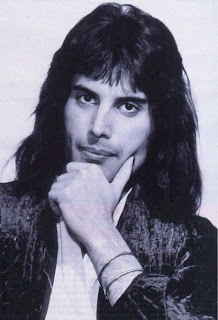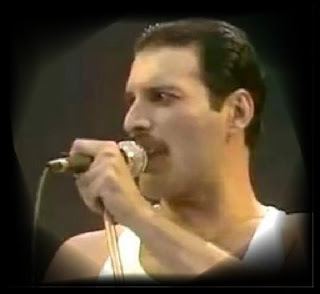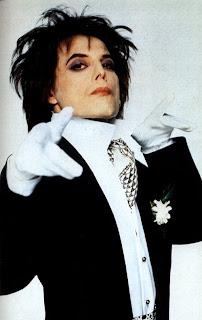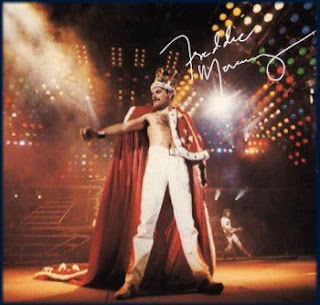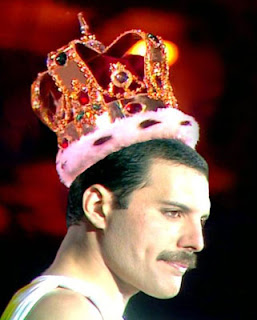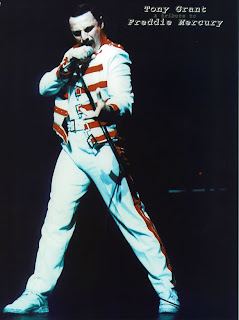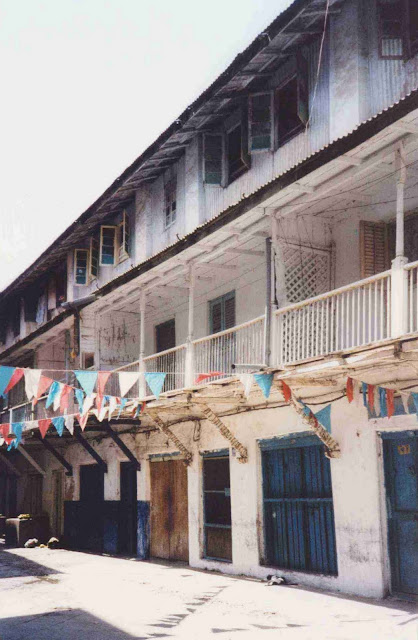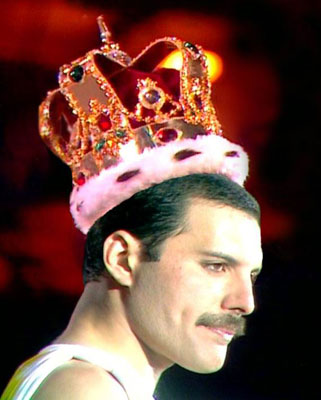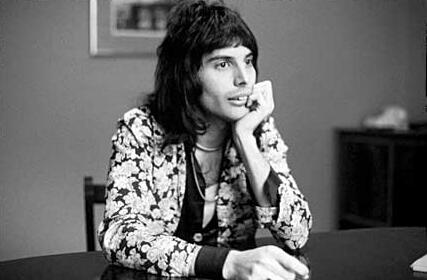
Athough Mercury's speaking
voice naturally fell in the
baritone range, he delivered most songs in the
tenor range.
[23] His vocal range extended from
bass low F (F2) to
soprano high F (F6).
[24] He could
belt up to
tenor high F (F5).
[24] Biographer
David Bret described his voice as "escalating within a few bars from a deep, throaty rock-growl to tender, vibrant tenor, then on to a high-pitched, perfect
coloratura, pure and crystalline in the upper reaches".
[25] Spanish
soprano Montserrat Caballé, with whom Mercury recorded an album, expressed her opinion that "the difference between Freddie and almost all the other rock stars was that he was selling the voice".
[26] She adds, "His technique was astonishing. No problem of
tempo, he sung with an incisive sense of rhythm, his vocal placement was very good and he was able to glide effortlessly from a register to another. He also had a great musicality. His phrasing was subtle, delicate and sweet or energetic and slamming. He was able to find the right colouring or expressive nuance for each word."
[24] As Queen's career progressed, he would increasingly alter the highest notes of their songs when live, often harmonising with seconds, thirds or fifths instead. Mercury was said to have "the rawest
vocal fold nodules" and claimed never to have had any formal vocal training.
[27]Songwriter
The most notable aspect of his songwriting involved the wide range of genres that he used, which included, among other styles,
rockabilly,
progressive rock,
heavy metal,
gospel and
disco. As he explained in a 1986 interview, "I hate doing the same thing again and again and again. I like to see what's happening now in music, film and theatre and incorporate all of those things."
[28] Compared to many popular songwriters, Mercury also tended to write musically complex material. For example, "Bohemian Rhapsody" is acyclic in structure and comprises dozens of
chords.
[29][30] He also wrote six songs from
Queen II which deal with multiple key changes and complex material. "Crazy Little Thing Called Love", on the other hand, contains only a few chords. Despite the fact that Mercury often wrote very intricate
harmonies, he also claimed that he could barely read music.
[31] He wrote most of his songs on the piano and used a wide variety of different key signatures.
[29]Live performer
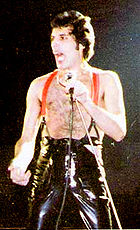
Mercury, performing live in 1979, with his bottomless microphone stand

Mercury performing live in 1984
Mercury was noted for his live performances, which were often delivered to stadium audiences around the world. He displayed a highly theatrical style that often evoked a great deal of participation from the crowd. A writer for
The Spectator described him as "a performer out to tease, shock and ultimately charm his audience with various extravagant versions of himself".
[32] David Bowie, who performed at the
Freddie Mercury Tribute Concert and recorded the song "
Under Pressure" with Queen, praised Mercury's performance style, saying: "Of all the more theatrical rock performers, Freddie took it further than the rest... he took it over the edge. And of course, I always admired a man who wears tights. I only saw him in concert once and as they say, he was definitely a man who could hold an audience in the palm of his hand."
[33]One of Mercury's most notable performances with Queen took place at
Live Aid in 1985, during which the entire stadium audience of 72,000 people clapped, sang and swayed in unison. Queen's performance at the event has since been voted by a group of music executives as the greatest live performance in the history of rock music. The results were aired on a television program called "The World's Greatest Gigs".
[34][35] In reviewing Live Aid in 2005, one critic wrote, "Those who compile lists of Great Rock Frontmen and award the top spots to
Mick Jagger,
Robert Plant, etc all are guilty of a terrible oversight. Freddie, as evidenced by his
Dionysian Live Aid performance, was easily the most godlike of them all."
[36]Over the course of his career, Mercury performed an estimated 700 concerts in countries around the world with Queen. A notable aspect of Queen concerts was the large scale involved.
[28] He once explained, "We're the
Cecil B. DeMille of rock and roll, always wanting to do things bigger and better."
[28] The band were the first ever to play in South American stadiums, breaking worldwide records for concert attendance in the
Morumbi Stadium in São Paulo in 1981.
[37] In 1986, Queen also played behind the
Iron Curtain when they performed to a crowd of 80,000 in
Budapest, in what was one of the biggest rock concerts ever held in Eastern Europe.
[38] Mercury's final live performance with Queen took place on 9 August 1986 at
Knebworth Park in England and drew an attendance estimated as high as 300,000.
[39]Instrumentalist

Freddie Mercury playing guitar during a live concert with
Queen in Frankfurt, Germany, 1984.
As a young boy in India, Mercury received formal piano training up to the age of nine. Later on, while living in London, he learned guitar. Much of the music he liked was guitar-oriented: his favourite artists at the time were
The Who,
The Beatles,
Jimi Hendrix,
David Bowie, and
Led Zeppelin. He was often self-deprecating about his own skills on both instruments and from the early 1980s onward began extensively using guest keyboardists for both Queen and his solo career. Most notably, he enlisted
Fred Mandel (a Canadian musician who also worked for
Pink Floyd,
Elton John and
Supertramp) for his first solo project, and from 1985 onward collaborated with
Mike Moran (in the studio) and
Spike Edney (in concert), leaving most of the keyboard work exclusively to them.
Solo career
In addition to his work with Queen, Mercury put out two solo albums and several singles. Although his solo work was not as commercially successful as most Queen albums, the two off-Queen albums and several of the singles debuted in the top 10 of the
UK Album Charts. His first solo effort involved his contribution to the
Richard "Wolfie" Wolf mix of
Love Kills on the 1984 album (the song also used as the end title theme for National Lampoon's "Loaded Weapon") and new soundtrack to the 1926
Fritz Lang film
Metropolis. The song, produced by
Giorgio Moroder, debuted at the number 10 position in the UK charts.
[42]Mercury's two full albums outside the band were
Mr. Bad Guy (1985) and
Barcelona (1988). The former is a pop-oriented album that emphasises disco and dance music. "Barcelona" was recorded and performed with the opera singer
Montserrat Caballé, whom he had long admired.
Mr. Bad Guy debuted in the top ten of the
UK Album Charts.
[42] In 1993, a remix of "
Living on My Own", a single from the album, reached the No.1 position on the
UK Singles Charts.
[43] The song also garnered Mercury a posthumous
Ivor Novello Award. Allmusic critic Eduardo Rivadavia describes
Mr. Bad Guy as "outstanding from start to finish" and expressed his view that Mercury "did a commendable job of stretching into uncharted territory".
[44] In particular, the album is heavily synthesiser-driven in a way that is not characteristic of previous Queen albums.
Barcelona, recorded with
Spanish soprano Montserrat Caballé, combines elements of popular music and opera. Many critics were uncertain what to make of the album; one referred to it as "the most bizarre CD of the year".
[45] The album was a commercial success,
[46] and the
album's title track debuted at the No.8 position in the UK charts and was a hit in Spain.
[47] The title track received massive air play as the official hymn of the
1992 Summer Olympics (held in
Barcelona one year after Mercury's death). Caballé sang it live at the opening of the Olympics with Mercury's part played on a screen, and again prior to the start of the
1999 UEFA Champions League Final in Barcelona.
[48] In addition to the two solo albums, Mercury released several singles, including his own version of the hit
The Great Pretender by
The Platters, which debuted at number five in the UK in 1987.
[42] In September 2006, a compilation album featuring Mercury's solo work was released in the UK in honour of what would have been his 60th birthday. The album debuted in the top 10 of the
UK Album Charts.
[49]In 1981–1983, Mercury recorded several tracks with
Michael Jackson, including a demo of "
State of Shock", "Victory" and "There Must Be More to Life Than This".
[50] None of these collaborations were officially released, although
bootleg recordings exist. Jackson went on to record the single "State of Shock" with
Mick Jagger for
The Jacksons's album
Victory.
[51] Mercury included the solo version of "There Must Be More To Life Than This" on his
Mr. Bad Guy album.
[52]
